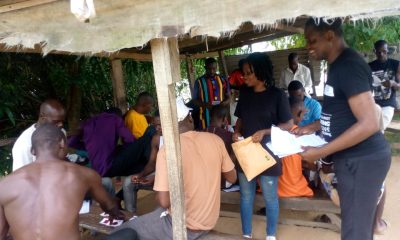NATIONAL NEWS
NAPTIP Restates Readiness To Fight Trafficking In Persons With Modern Technologies, Trends
The National Agency for the Prohibition of Trafficking in Persons (NAPTIP) stated that it is always ready to adopt current technology and procedures to combat the country’s escalating incidences of trafficking in persons.
Prof. Fatima Waziri-Azi, the agency’s Director General, stated this on Thursday during the Official Launch of the NAPTIP-IPA Collaborative Project titled “Promoting Evidence-Based Anti-Trafficking Efforts in Nigeria.”
She said: “This collaborative venture between NAPTIP and IPA marks a pivotal shift towards strategic and informed interventions, setting the stage for a more impactful and nuanced approach in our ongoing fight against human trafficking, generously supported by the US Department of State Program to End Modern Day Slavery.”
She noted that: “What makes this project particularly exciting is its emphasis on evidence-based anti-trafficking efforts—a methodology that provides a solid foundation for a comprehensive, efficient, and impactful response to the multifaceted challenges posed by human trafficking.
“It empowers stakeholders with the knowledge needed to make informed decisions, ultimately contributing to the eradication of this heinous crime.”
Waziri-Azi said: “Human trafficking is an intricate and pervasive issue that demands our unwavering attention. To address this challenge effectively, we must continue to understand the ever-evolving landscape we are dealing with. This understanding cannot rely solely on intuition or assumptions; it must be grounded in evidence.”
She revealed that: “Over the last five years, we’ve witnessed an alarming transformation in the landscape of human trafficking in Nigeria. It’s no longer confined to its conventional, familiar form.
“Traffickers have expanded their operations, infiltrating the online sphere as much as the offline world. This shift has brought forth new and unsettling trends that are reshaping the human trafficking ecosystem, compelling us to revolutionize our strategies in response to these disturbing developments.
“Human trafficking is not just a statistic. It is the faces, the stories, and the hopes of those who suffer. We must understand its intricacies—how it thrives in the shadows, exploiting desperation and despair. We must recognize that behind every case, there is a human face.
“And Data emerges as our most potent weapon in this fight. It reveals patterns, highlights vulnerabilities, and guides our interventions. A data-driven approach empowers us to identify high-risk areas, understand trafficking routes, and recognize the specific vulnerabilities of different demographics. By harnessing the power of data, we move beyond anecdotal evidence to create targeted and impactful solutions.”
She recalled that NAPTIP and IPA joined forces to strengthen the data collection, analysis, and research capacity of NAPTIP through the use of verifiable data in public policy making, stressing that: “In collaboration, NAPTIP brings its policy expertise, data, and information for policy-making, while IPA contributes its data collection, analysis, and evidence generation expertise that would improve the effectiveness of counter-trafficking programmes in Nigeria.”
Waziri-Azi noted that the ultimate goal of the collaboration is to empower NAPTIP to use data and rigorous research to design, test and scale evidence-based programmes and policies resulting in a significant, measurable reduction in the prevalence of human trafficking in Nigeria.
She insisted that “promoting evidence-based anti-trafficking efforts is not an option; it is an imperative. And our commitment to this cause must permeate every aspect of our strategies—from prevention to prosecution, from awareness campaigns to victim support.”
On her part, the Country Representative of Innovations for Poverty Action (IPA), Funmilayo Ayeni while noting that human and sex trafficking issues related to poverty, said there is an urgent need to address post-economic exploitation, sexual exploitation, child labour, servitude and modern-day slavery.
She noted that through this project which is funded through the Program to End Modern Slavery in the US Department of State’s Office to Monitor and Combat Trafficking in Persons, IPA will support, the Nigerian government in reducing human trafficking by establishing a Human Trafficking Embedded Evidence Lab- a permanent infrastructure that will equip NAPTIP to develop and deliver more effective, evidence-based policies and programmes to combat sex trafficking.
She added this lab aims to support the institutionalization of a culture of evidence-based decision-making by mapping administrative data, working side-by-side with NAPTIP teams and partners on capacity building, and evaluating innovations in human trafficking policies.
-
CRIME3 years ago
PSC Dismisses DCP Abba Kyari, To Be Prosecuted Over Alleged $1.1m Fraud
-
FEATURED3 years ago
2022 Will Brighten Possibility Of Osinbajo Presidency, Says TPP
-
FEATURED2 years ago
Buhari’s Ministers, CEOs Should Be Held Accountable Along With Emefiele, Says Timi Frank
-
BUSINESS & ECONOMY2 years ago
Oyedemi Reigns As 2023’s Real Estate Humanitarian Of The Year
-
SPORTS1 year ago
BREAKING: Jürgen Klopp Quits Liverpool As Manager At End Of Season
-
SPORTS2 years ago
Could Liverpool Afford Kylian Mbappe For €200 million? Wages, Transfer Fee
-
ENTERTAINMENT2 years ago
Veteran Nigerian Musician, Basil Akalonu Dies At 72
-
FEATURED2 years ago
Tribunal Judgement: Peter Obi Warns Of Vanishing Electoral Jurisprudence, Heads To Supreme Court
-
BUSINESS & ECONOMY2 years ago
Oyedemi Bags ‘Next Bulls Award’ As BusinessDay Celebrates Top 25 CEOs/ Business Leaders
-
FEATURED3 years ago
2023 Presidency: South East PDP Aspirants Unite, Demand Party Ticket For Zone



































